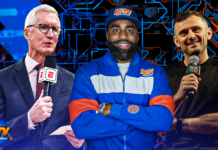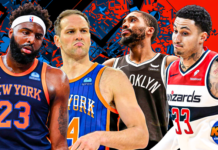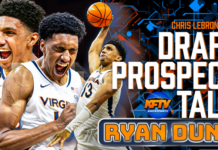Once again, the New York Knicks are in the market for a starting point guard. Should that person be Immanuel Quickley?
Should Immanuel Quickley be the New York Knicks starting point guard?
If you were to ask me this question at the beginning of the season, I would have said no because of his struggles. Also, looking at his stats alone, it wasn’t comparable to his rookie season.
Before the All-Star Break, Quickley averaged 9.4 points, 2.3 rebounds, 3 assists, 36.8 field goal percentage (8.5 FGA), 32.8 three-point percentage (4.9 3PA), and 91.4 free throw percentage (1.7. FTA) during 21.3 minutes per game.
During Quickley’s rookie season, he averaged 11.4 points, 2.1 rebounds, 2 assists, 39.5 field goal percentage (9.1 FGA), 38.9 three-point percentage (4.7 3PA), and 89.1 free throw percentage during 19.4 minutes per game. IQ’s had similar statistics for this season, except he averaged a few more minutes, and his three-point percentage took a dip.
Now, the stats aren’t the only reason that gave me pause about IQ becoming the New York Knicks’ starting point guard for the 2022-23 NBA season. When we watched IQ play, he didn’t know when to take his shots, how to get his teammates involved, and how to control the pace of the game.
To put it simply, Quickley was overthinking how to play the position.
However, after the All-Star break, Quick flipped a switch (FLIP, FLIP). And since then, his game went to a new level.
Since the break, Quickley averaged 16 points, 5.2 rebounds, 4.8 assists, 43.9 field goal percentage (11.3 FGA), 38.3 three-point percentage (5.6 three-point attempts), and 85.2 free throw percentage (4.7 free throw attempts) within 27.5 minutes per game.
But once again, it’s more than just the numbers. Quickley was a tactician on the court, and we saw that because his command of the offense was noticeable. IQ was directing traffic, controlling the tempo, and taking good shots instead of just putting up junk. Frankly, his decision-making was refreshing because we haven’t seen this level of poise from IQ with the rock in his hands (granted, we caught a glimpse of his composure in summer league).
Just look at this clip right here:
And here is another one of IQ:
But the most encouraging aspect of Quickley’s improved game is his increase in drives to the basket (shout out to Shwin for the stats).
As you can see in the clip below, Quick’s ability to attack the basket causes defenses to honor him and open up shooters on the perimeter.
Now, even though IQ drove more to the basket, he wasn’t the most lethal finisher around the rim — he completed 48/72 shots which translates to 67 percent. But he at least was finishing layups, which is a step forward from last season. However, what Quickley needs to do is not only improve his finishing around the rim but develop a consistent mid-range jump shot as well instead of relying on the floater so much, then he’ll really be an offensive threat.
In addition to Quickley’s success in turning around his shooting woes and figuring out his playmaking chops, his defense was on point this entire season.
At the beginning of the season, I said that IQ would be on my all-defense lineup because I saw his tenacity as an on-ball defender in the summer league. Quick’s defense was eye-popping in summer league because he didn’t demonstrate that defensive intensity as a rookie. Sure, there were times when he gambled too much when it came to jumping the passing lanes. Yet, his improvement and overall effort on that side of the ball were outstanding.
So with IQ having a solid finish to the season, it raises the question if he should be a point guard heading into next season.
If you have been following me on Knicks Fan TV or Knicks, Jets, Etc. (a podcast that I host) I have been banging the drum for the Knicks to get Jalen Brunson. I’ve been on the Brunson train because he’s been a consistent piece to the Mavericks’ success this season, and the Knicks haven’t had a point guard in God knows when. But with IQ taking another step in his development and next season being the third year of his rookie contract, I am leaning towards the Knicks rolling with Quickley being the starting point guard.
Now I’m not entirely off the Brunson train and wouldn’t be upset if the Knicks got him this offseason (for the right price).
But considering Quickley’s development in the number of minutes he was playing towards the end of the season and his efficiency level, there is a valid argument to have him as the starter next season. The fact that IQ ended the season with an average of 27.5 (close to averaging 30 minutes!) and looked good playing in that amount of time makes it difficult to keep him on the bench.
Between signing Brunson (really any point guard) or giving Quick the keys, that is the juxtaposition the Knicks put themselves in since they didn’t start Quickley after the trade deadline or the All-Star Break. If they had let IQ run point and see what they had in him, then New York probably wouldn’t have a hard decision to determine if they need to add a point guard via trade or free agency or if Quickley is their solution.
On top of that, we heard Berman report on The Putback with Ian Begley that Quickley and his camp were disappointed in his minutes to start the season. Sure, Quick’s minutes increased past the All-Star break. But Quickley is young, and I am sure that he has higher aspirations than to be a bench player for the remainder of his career (if we look at his confidence and his demeanor, it screams a player that wants to get better and have a more significant role in the NBA).
Quickley deserves his shot. Yet I get the idea of signing Brunson. As I said, Brunson is a steady hand, can create his own shot, gets into the paint, finishes very well around the rim, and can put the team on his back (as we’ve seen from him in these playoffs). But the issue with signing Brunson is that it may impact Quickley’s time on the court.
Both guards are undersized, and we already know Thibodeau doesn’t like playing two small guards in the same lineup for an extended time. And since Jalen averaged 31.9 minutes this season and Quickley averaged 27.5 post All-Star break, there just isn’t enough time for them to be on the court together. Mixing that information with the fact that IQ will be in the third year of his contract, and New York will have to decide whether to extend or trade makes it that much more challenging to go after Brunson.
As I said, I wouldn’t be upset with the Knicks getting Brunson for the right price (also, I’m about the team first over an individual player), but the Knicks have a tough decision to make. The front office must ask themselves if they believe that Quickley will continue to build upon his season-end solid performance. And to be honest, they don’t have to look that far for an example because Obi Toppin did just that (Obi started the 2020-21 season slowly but finished strong in the playoffs. Then he started this season on a strong foot, and ended the season with a Mike Breen, “BANG!”).
Stay tuned to KnicksFanTV.com for the latest Knicks news, rumors, and recaps throughout the 2021-22 NBA season. And in case you missed it, check out CP’s interview with Fred Katz of The Athletic.
















I find it odd that Thibs doesn’t have enough confidence in starting Quickley regularly. On the roster Quickley’s game is most similar to Derrick Rose. Not to say he is identical but he is a guard that can drive to the basket and shoot. His potential is enough of a reason to give him starting minutes. I think everyone agrees that other possible options at PG are either not worth the price or not good enough period. In my opinion he is not a true point guard and the offense might have to run through RJ for the time being. RJ has to step up and develop as a point forward. Because the Knicks are nowhere near contenders they should play their young athletes and Quickley needs starting minutes to make a final decision on him.
IQ definitely needs to get the chance to start if the Knicks don’t address the PG situation this offseason.
RJ playing the point forward has me concerned, though, because he doesn’t have a tight enough handle or the advanced playmaking skills to orchestrate an offense.